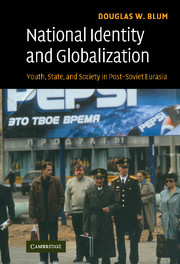Book contents
- Frontmatter
- Contents
- Acknowledgments
- Introduction
- 1 Global responses to globalization
- 2 Theoretical assumptions and methods
- 3 The discourse of globalization and youth culture
- 4 National youth identity policy
- 5 Collaborative entrepreneurship
- 6 Shaping national youth identity on the ground
- 7 Conclusions
- References to scholarly works
- Index
1 - Global responses to globalization
Published online by Cambridge University Press: 22 September 2009
- Frontmatter
- Contents
- Acknowledgments
- Introduction
- 1 Global responses to globalization
- 2 Theoretical assumptions and methods
- 3 The discourse of globalization and youth culture
- 4 National youth identity policy
- 5 Collaborative entrepreneurship
- 6 Shaping national youth identity on the ground
- 7 Conclusions
- References to scholarly works
- Index
Summary
This chapter reviews the literature on cultural globalization. My argument is that globalization produces a strikingly similar pattern, virtually wherever it is encountered. First, the combination of seductive content, disparities in power, and the sheer volume of flows comprising globalization produces a homogenizing tendency, to which post-Soviet elites and mass publics alike are highly sensitive. Rather than being perceived in terms of innocuous “flows,” globalization is therefore widely understood as an inundating wave of uniformity that threatens to wash away all cultural difference, undermining the foundation of distinct social and political institutions. Due to the globally dominant discourse of nationalism and the singular legitimacy of the nation-state model, this generates a specific pattern of reaction, marked by desire, anxiety, and the wish to affirm an autonomous (national) self. I illustrate this prevailing response to global cultural flows with examples drawn from a wide variety of countries, and by briefly focusing on the cases of postcolonial India and post-Maoist China. In doing so, I emphasize the deeply ambivalent nature of this process, as well as the abiding ambiguities associated with it.
Comparative hybridization
Much of the controversy over globalization has focused on its ultimate consequences, including the question of whether national identities are likely to be supplanted by local and/or transnational affiliations. A related question is whether, over the longue durée, the underlying content of national identities will come to mirror each other through the proliferation of international flows.
- Type
- Chapter
- Information
- National Identity and GlobalizationYouth, State, and Society in Post-Soviet Eurasia, pp. 12 - 49Publisher: Cambridge University PressPrint publication year: 2007



